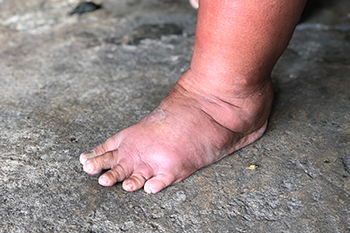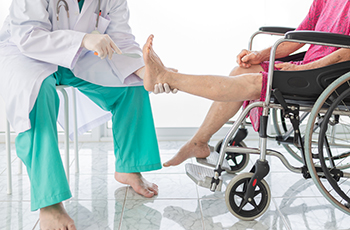Flint Office
1303 S. Linden Rd., Suite D
Flint, MI 48532

Salt is a mineral that is familiar to the vast majority of Americans. Countless different people around the country choose to flavor their food by sprinkling salt on it almost every day. However, excessive salt intake can have potentially negative consequences for the feet. Specifically, when an individual eats too much salt, their ankles can effectively swell up because of increased water retention. Therefore, before eating too much salt, someone who is experiencing swollen feet might be more hesitant to increase their salt intake. If you are living with persistently swollen ankles, it is highly suggested that you schedule an appointment with a podiatrist today who can answer any questions you might have and provide treatment.
Swollen feet can be a sign of an underlying condition. If you have any concerns, contact one of our podiatrists of Community Podiatry Group. Our doctors can provide the care you need to keep you pain-free and on your feet.
Swollen feet are a common ailment among pregnant women and people who stand or sit for extended periods. Aging may increase the possibility of swollen feet and patients who are obese often notice when their feet are swelling too. There may be medical reasons why swollen feet occur:
Swollen feet can also be caused by bone and tendon conditions, including fractures, arthritis, and tendinitis. Additionally, there may be skin and toenail conditions and an infection may cause the feet to swell. Patients who take medicine to treat high blood pressure may be prone to getting swollen feet.
Many patients elevate their feet to help relieve the swelling and this is generally a temporary remedy. When a podiatrist is consulted the reason behind the swelling can be uncovered and subsequently treated.
If you have any questions please feel free to contact our office located in Flint, MI . We offer the newest diagnostic tools and technology to treat your foot and ankle needs.

A broken foot is a common injury that can happen from falling or if a heavy object falls on it. There is often no mistaking if the foot has been fractured, as it is generally accompanied by severe pain and discomfort. Additional symptoms can include tenderness in the overall foot, difficulty in walking or standing, and you may hear a cracking sound when it is moved. Having an X-ray performed is often an efficient method of obtaining a proper diagnosis, and this is effective in determining the severity of the fracture. Treatment is generally done by placing the affected foot in a boot or cast, and crutches may be necessary in keeping weight off of the foot as the healing process occurs. It is helpful to elevate the foot as often as possible, and specific stretches may need to be performed after it has healed. If you have broken your foot, it is suggested that you speak with a podiatrist as quickly as possible who can help you with proper treatment methods.
A broken foot requires immediate medical attention and treatment. If you need your feet checked, contact one of our podiatrists from Community Podiatry Group. Our doctors can provide the care you need to keep you pain-free and on your feet.
Broken Foot Causes, Symptoms, and Treatment
A broken foot is caused by one of the bones in the foot typically breaking when bended, crushed, or stretched beyond its natural capabilities. Usually the location of the fracture indicates how the break occurred, whether it was through an object, fall, or any other type of injury.
Common Symptoms of Broken Feet:
Those that suspect they have a broken foot shoot seek urgent medical attention where a medical professional could diagnose the severity.
Treatment for broken bones varies depending on the cause, severity and location. Some will require the use of splints, casts or crutches while others could even involve surgery to repair the broken bones. Personal care includes the use of ice and keeping the foot stabilized and elevated.
If you have any questions please feel free to contact our office located in Flint, MI . We offer the newest diagnostic and treatment technologies for all your foot and ankle needs.

Flat feet is a condition of the foot in which the patient does not present an arch. As a result, the entire foot rests flush against the ground. Children are one group that can be affected by flat feet. Importantly, flat feet can be normal for infants and young children. This is because a young infant’s feet are still growing and developing. Particularly, the foot muscles and soft tissues are still stiffening. If, as your child ages, an arch forms on their feet yet they subsequently experience flat feet and it begins to diminish their quality of life, then it is suggested that they are under the care of a podiatrist. A podiatrist specializes in treating the health of the feet, and they will be able to provide any treatment that your child might potentially need for their flat feet.
Making sure that your children maintain good foot health is very important as they grow. If you have any questions, contact one of our podiatrists of Community Podiatry Group. Our doctors can provide the care you need to keep you pain-free and on your feet.
Keeping Children's Feet Healthy
Having healthy feet during childhood can help prevent medical problems later in life, namely in the back and legs. As children grow, their feet require different types of care. Here are some things to consider...
Although babies do not walk yet, it is still very important to take care of their feet.
Avoid putting tight shoes or socks on his or her feet.
Allow the baby to stretch and kick his or her feet to feel comfortable.
As a toddler, kids are now on the move and begin to develop differently. At this age, toddlers are getting a feel for walking, so don’t be alarmed if your toddler is unsteady or ‘walks funny’.
As your child gets older, it is important to teach them how to take care of their feet.
Show them proper hygiene to prevent infections such as fungus.
Be watchful for any pain or injury.
Have all injuries checked by a doctor as soon as possible.
Comfortable, protective shoes should always be worn, especially at play.
If you have any questions please feel free to contact our office located in Flint, MI . We offer the newest diagnostic and treatment technologies for all your foot and ankle needs.

People who are over 50 years old may notice the aging process has begun. The feet may begin to widen if additional weight is gained, which may cause heel pain to develop. The fat pads are known to lose some of their elasticity and cushioning, and different shoes may need to be worn. After many years of walking and standing, corns and calluses may be noticed. This can happen as a result of wearing shoes that do not fit correctly for long periods of time. Additionally, for the same reasons, bunions and hammertoe may gradually form, possibly causing pain and discomfort. Caring for the feet in elderly people is important in preventing many of these types of foot conditions. This can be done by wearing shoes that fit correctly, properly trimming the toenails weekly, and wearing custom-made orthotics for comfort, if necessary. If you have questions about what proper foot care is for elderly people, it is suggested that you speak with a podiatrist who can address any questions you may have.
Proper foot care is something many older adults forget to consider. If you have any concerns about your feet and ankles, contact one of our podiatrists from Community Podiatry Group. Our doctors can provide the care you need to keep you pain-free and on your feet.
The Elderly and Their Feet
As we age we start to notice many changes in our body, but the elder population may not notice them right away. Medical conditions may prevent the elderly to take notice of their foot health right away. Poor vision is a lead contributor to not taking action for the elderly.
Common Conditions
Susceptible Infections
Diabetes and poor circulation can cause general loss of sensitivity over the years, turning a simple cut into a serious issue.
If you have any questions please feel free to contact our office located in Flint, MI . We offer the newest diagnostic and treatment technologies for all your foot and ankle needs.